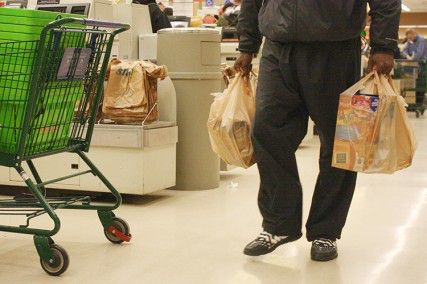
Although bans on disposable plastic bags and polystyrene in Brookline businesses were put into effect on Sunday, they will not be enforced until January, Brookline officials said.
The delay on the ban, which affects around 350 businesses in Brookline, is a way to ensure the law is obeyed without hurting the city’s economy, said Brookline Commissioner of Public Health Alan Balsam.
“I’m not interested in killing anyone’s business,” he said. “What I’m all about is making sure that people comply. Whether they comply today or they comply next Tuesday is of no consequence in the broad scheme of things.”
Businesses can exhaust their current supplies of plastic bags and polystyrene cups, and come January, Balsam said businesses are allowed to apply for a waiver that would permit an additional six-month grace period before they would face any penalties.
The Brookline Town Meeting approved the bans in Nov. 2012, and businesses were notified about the change in March 2013 after review from Mass. Attorney Gen. Martha Coakley’s office.
Not all businesses are subject to the ban. Only those with at least 2,500 square feet of retail space or retail pharmacies and supermarkets with annual sales of at least $1 million will be forced to comply when the ban is enforced, including Dunkin’ Donuts near Boston University’s South Campus.
Dunkin’ Donuts, one food establishment that has been working to comply with the bans, replaced their Styrofoam coffee cups with insulated paper cups in August, but they are still searching for an alternative to the plastic lid to comply with the ban.
“Some people like the foam cup, but a lot of people like the paper cup too, so it’s not hard to change over,” said Niroj Shrestha, store manager of Dunkin Donuts at 1008 Beacon St. in Brookline. “Other Dunkin’ [stores] are still using the foam cups because the paper cup is a little bit more expensive than the foam cup, but we are cooperating with Brookline.”
Whole Foods Market in Brookline has not used plastic bags in their store since Earth Day 2008, and they have stopped using Styrofoam packaging in their meat department.
“We care about our planet and we’re trying to go green,” said Jean-Philippe Scioville, marketing specialist for the Brookline Whole Foods. “[The ban] really shouts out the green message that not only we’re trying to do, but the whole town of Brookline should be doing.”
Some Brookline residents said they were worried about finding efficient alternatives to plastic and Styrofoam packaging, but willing to make the change to help the environment.
“Brookline residents are pretty aware of what’s going on, maybe even more than other cities,” said Kiryoung Kim, 43. “They always try to cut down on using plastic bags and just use their own bags. I usually do that.”
Conor Stack, 29, a physician, said he was concerned about how the ban would affect businesses that could not find alternative measures in time.
“It’s probably helpful from an environmental perspective, but it may not be helpful from a personal perspective if I no longer have the bags I need to carry things around,” he said. “I’m okay with them taking away the plastic. I think it’s probably better for the broader good, but I hope they come up with something else.”
Karl Fries, 25, who works for a mutual fund company, said he was wary of the economic impact of the ban, but supported the town’s decision to be lenient with enforcing it.
“You don’t want to hurt businesses and raise their costs too much, but at the same time, it’s important to be cognizant of the impact that Styrofoam and non-recyclables have on the environment,” he said. “It’s a tricky one. You’ve got to make sure you weigh both sides of the argument … [but] the ban is a good idea.”


















































































































